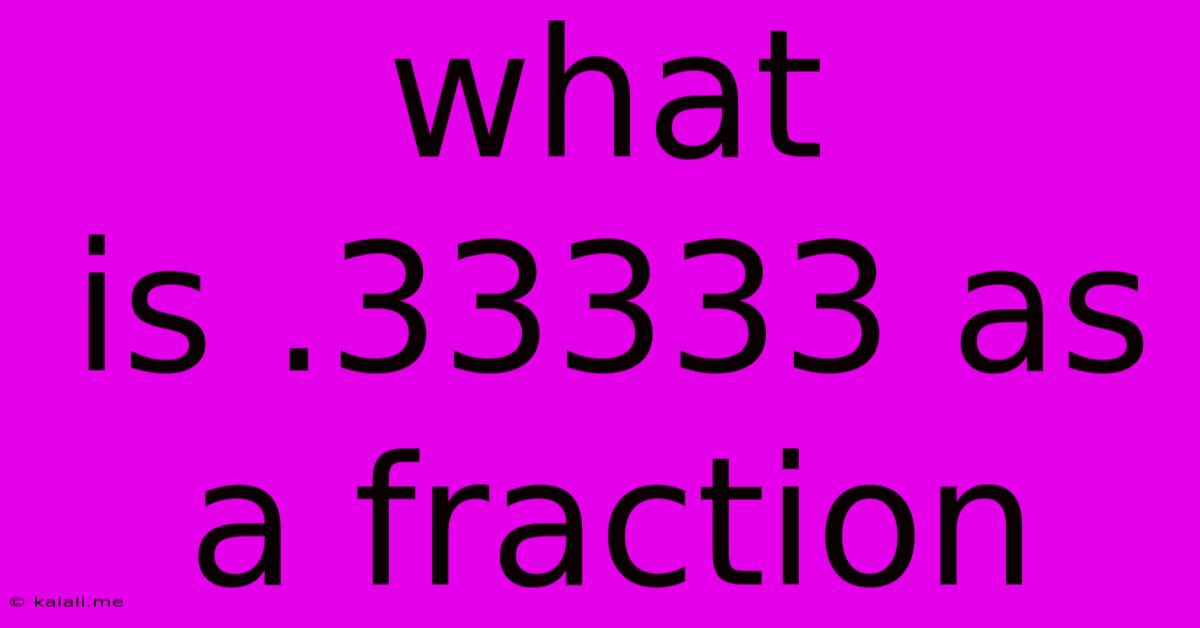What Is .33333 As A Fraction
Kalali
May 08, 2025 · 2 min read

Table of Contents
What is 0.33333... as a Fraction? Understanding Repeating Decimals
Have you ever wondered how to represent the decimal 0.33333... as a fraction? This seemingly simple decimal is actually a perfect example of a repeating decimal, and converting it to a fraction involves a straightforward process. This article will guide you through the steps, explaining the concept and providing a clear solution. This will help you understand repeating decimals and how to convert them into their fractional equivalents.
Understanding Repeating Decimals
A repeating decimal, also known as a recurring decimal, is a decimal number that has a digit or a group of digits that repeat infinitely. In the case of 0.33333..., the digit "3" repeats endlessly. We represent this with a bar over the repeating digit: 0.$\overline{3}$. This notation clarifies that the 3 repeats indefinitely. Understanding this notation is key to converting these decimals into fractions.
Converting 0.33333... to a Fraction
The method for converting a repeating decimal to a fraction involves algebra. Here's how we do it for 0.$\overline{3}$:
-
Let x equal the decimal: We start by assigning a variable, typically 'x', to the repeating decimal. So, let x = 0.33333...
-
Multiply to shift the repeating part: We multiply both sides of the equation by a power of 10 that shifts the repeating part to the left of the decimal point. Since only one digit repeats, we multiply by 10: 10x = 3.33333...
-
Subtract the original equation: Now, we subtract the original equation (x = 0.33333...) from the multiplied equation (10x = 3.33333...). Notice what happens: 10x - x = 3.33333... - 0.33333... 9x = 3
-
Solve for x: Finally, we solve for x by dividing both sides by 9: x = 3/9
-
Simplify the fraction: The fraction 3/9 can be simplified by dividing both the numerator and denominator by their greatest common divisor, which is 3: x = 1/3
Therefore, 0.33333... is equal to 1/3.
Further Applications and Examples
This method can be applied to other repeating decimals. For example, to convert 0.66666... (or 0.$\overline{6}$) to a fraction, follow the same steps:
- Let x = 0.66666...
- 10x = 6.66666...
- 10x - x = 6.66666... - 0.66666... => 9x = 6
- x = 6/9 = 2/3
This demonstrates the process is consistent and applicable to various repeating decimals. Remember to always simplify the resulting fraction to its lowest terms. The key is identifying the repeating pattern and using the appropriate power of 10 to shift the repeating digits.
Conclusion
Converting repeating decimals to fractions might seem daunting initially, but with the systematic approach explained above, it becomes a straightforward algebraic process. This knowledge is invaluable for understanding the relationship between decimals and fractions, and it strengthens your mathematical skills. Now you can confidently tackle any repeating decimal and transform it into its equivalent fraction.
Latest Posts
Latest Posts
-
What Do Photosynthesis And Respiration Have In Common
May 08, 2025
-
How Many Sides On A Rhombus
May 08, 2025
-
5 3 Oz Is How Many Grams
May 08, 2025
-
What Is 10 Percent Of 85
May 08, 2025
-
Cuantos Son 7 Pies En Metros
May 08, 2025
Related Post
Thank you for visiting our website which covers about What Is .33333 As A Fraction . We hope the information provided has been useful to you. Feel free to contact us if you have any questions or need further assistance. See you next time and don't miss to bookmark.